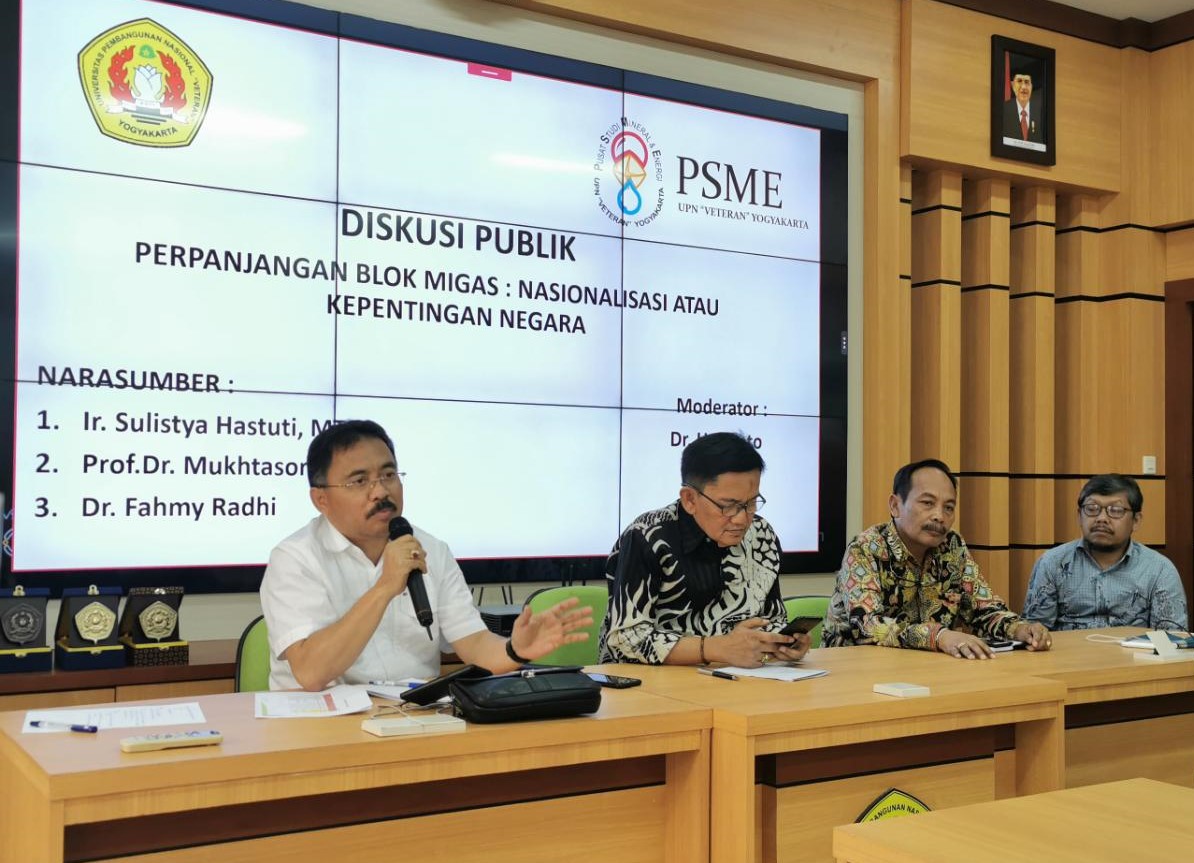SLEMAN – The Mineral & Energy Studies Center of UPN "Veteran" Yogyakarta held a public discussion on the topic of the Extension of the Oil and Gas Block: Between Nationalization VS State Interests by presenting the expert of SKK Oil and Gas - Sulistya Hastuti Wahyu, the Observer of UGM Energy Economics - Dr. Fahmy Radhi, Professor of ITS Marine Technology / former Member of DEN 2009-2014 - Prof. Dr. Mukhtasor, Friday (8/16/2019).
As it is known, the oil and gas blocks given to national and foreign Cooperation Contract Contractors whose contracts expire in 2015-2024 contributed 72.5% of the national oil and gas production. Based on these data, the potential for termination blocks is certainly very interesting, and there has been discussion and discourse since 2013 about who is more appropriate to manage the extension of the blocks, whether the National Oil Company (NOC), namely Pertamina, or handed over to the existing contractual holders at that time. The consideration for those who propose was submitted to Pertamina because Pertamina only controls around 24% of the national oil and gas production. It is still losing compared to Petronas by 50% or Saudi Aramco by 99%. Then, a narrative was then built on the need for the state to show its alignment to Pertamina as an NOC based on the mandate of Article 33 of the 1945 Constitution.
Fahmy Radhi in this discussion said that the government gave the management of the Mahakam Block which expired in 2015 directly 100% to Pertamina. Unfortunately, the production actually dropped compared to when it was still managed by the previous operator, even though the reserves in the Mahakam Block are still large. "What's wrong with Pertamina? Because there is another fact that Block after it was handed over to Pertamina, the North West Java Offshore production also dropped and there was an accident and it has not yet been handled”, continued Fahmi Rady.
The extension of the Rokan Block which uses a tender mechanism and was again won by Pertamina because of a greater investment commitment than Chevron, shows that the extension of the terminated oil and gas block by means of nationalization was broken because it was obtained through a business-to-business tender.
The extension of the Corridor Block is currently being talked about because there is dissatisfaction because Pertamina was not 100% as its manager. Responding to this, Sulistya said that the government continued to pay attention to Pertamina as the NOC. "Even though its shares are not the largest one in the Corridor Block consortium, Pertamina has an important role and influence related to policy because it will act as an operator in 2026", Sulistya said.
On the other hand, the oil and gas balance has deficited continuely to grow since 2014, and the peak was in July 2019 when President Jokowi expressed his complaint and asked the relevant ministries namely the Ministry of SOEs and ESDM to take steps to reduce the oil and gas balance deficit because it provides the largest portion of Indonesia's trade balance deficit which continuely grow, causing the economy grow stagnant.
Mukhtasor said that in article 33 of the 1945 Constitution, it was emphasized that in managing the state assets, the wealth must be given to the people as much as possible, not focusing on managing the state assets. "In the book published by Mohammad Hatta on economic politics, the meaning of being controlled by the state does not mean that the government itself with its bureaucracy runs its companies. The foreign management can also run the companies by continuously increasing the number of workers and local content. "It means that Bung Hatta, who is the father of the Cooperative, still opens the opportunities for the foreign companies to get involved in the national economy," Mukhtasor continued.
During the discussion, Mukhtasor also highlighted the continued decline in Pertamina's performance due to the low efficiency, whereas Pertamina succeeded in producing the biggest profit in history to beat Petronas's profit in 2016. After seeing the current condition of Pertamina which is still unloading management pairs, then declining performance, it can be imagined how the fate of the national oil and gas production will be if everything is handed over to Pertamina. So, it is true what is done by the government, which is to balance the management of the national oil and gas industry by always placing the interests of the state for the welfare of the people as the main foundation by continuing to strengthen Pertamina's capacity.
Jl. SWK 104 (Lingkar Utara), Condongcatur, Yogyakarta 55283 (Kampus Pusat)
Jl. Babarsari 2 Yogyakarta 55281(Kampus Unit II) | Telp. +62 274 486733



